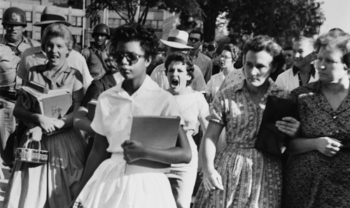
A few pivotal moments enter history marked with an intensity and a vividness passing years do not diminish. One such event was the integration of Central High School in Little Rock, Arkansas.
In 1954, the landmark Supreme Court decision Brown v. Board of Education mandated the integration of racially segregated schools. Three years later, Central High School remained rigidly segregated. On September 4, 1957, however, nine black students were to attend classes there for the first time.
The world watched. Our members watched, too. Our union already had a record of fighting for equal rights, and many members knew prejudice and the pain and damage it inflicted firsthand. They undoubtedly felt a special link to the brave students prepared to put themselves at risk. One of them, Elizabeth Eckford, was the niece of Scotty Eckford, the recording secretary of Local 6.
Governor Orval Faubus had ordered the soldiers of the Arkansas National Guard mobilized. On the morning of September 4, soldiers with bayonets in their guns turned the nine black students away from the public high school it was their right to attend. Their white classmates were allowed to pass through the barricades and into the school.
News stories, television coverage, and photographs memorializing the appalling events of that day flashed around the world. No images were more striking, or more heartbreaking, than those of 15-year-old Elizabeth Eckford.
She had arrived first, and alone. Angry swarms of white people confronted her, jeering, chanting, and shouting epithets. Three times she tried to enter the school. Each time soldiers barred her from entering, and, the third time, directed her away.
She walked on, toward a bus stop, seeking a bus to take her to safety. A photograph-one of the most enduring images of the civil rights movement in the United States-shows her walking away from the school. She is starkly and completely alone, and easily within striking distance of those at the front of the large and frightening crowd of white people following her.
It is impossible to look at this searing photograph without trying to comprehend what young Elizabeth Eckford might have been thinking and feeling at that time. It is painful to contemplate how frightened she must have been and how alone and vulnerable she must have felt.
To their credit, many of our members at that time did try to think about what she and the eight other students-Minnijean Brown, Ernest Green, Thelma Mothershed, Melba Patillo, Gloria Ray, Terrance Roberts, Jefferson Thomas, and Carlotta Walls-not only thought and felt that day but also throughout that school year which followed. They respected the courage and dignity the students had displayed, worried about the wrenching experiences they had endured, recognized the strength it must have taken each one of them simply to go off to each day of school, not knowing what price they might have to pay for doing it.
In so thinking, our members nonetheless kept in mind that these remarkable young men and women were still only teenagers despite the maturity they consistently displayed to the world watching them. And in their touching determination to obtain a good education, they daily sacrificed the pleasures, adventures, and simple joy those special years should bring.
Our members set about to do what they could to see that this brave group was recognized and appropriately honored for so greatly advancing the struggle for equal rights for all in our country. They also determined to do their best to provide the group with a collection of experiences that would bring smiles to those young faces and some fun and laughter into their lives.
With these goals in mind, our members brought their considerable talents for planning and organizing to bear and emerged with a plan they turned into reality. They considered the enormity of what the Nine had risked and what they had accomplished. The decision came rapidly and readily. Our union would honor each by jointly awarding them its Better Race Relations Award. It would, at its expense, bring the entire group to New York City, where the award would be presented to them. Following the ceremony, our union would give them a taste of New York City so they could accumulate a storehouse of positive experiences and happy memories to take away.
On June 12, 1958, the awards ceremony took place in the Gertrude Lane Auditorium at the union. The impressive ceremony unfolded before an enthusiastic overflow audience of proud members, as well as noted speakers and guests, including Roy Wilkens, the executive director of the National Association for the Advancement of Colored People, and New York Governor Averell Harriman. Large numbers of reporters and photographers were present to record the event. United States Senator Jacob K. Javits, detained by an evening session of the Senate, sent a congratulatory telegram to the students which was read at the gathering.
Elizabeth Eckford and Ernest Green, who became the first black student to graduate from Central High School, spoke on behalf of their group. With the presentation of the award to them in 1958, the students became the fifth recipients of the Local 6 Better Race Relations Award. The magnitude of their collective accomplishment was highlighted by the fact that the previous year's recipient had been the Rev. Dr. Martin Luther King, Jr.
Reading accounts of this moving event makes one wistful at not having been in attendance. Our members took the young people to their hearts; a member who was present later wrote, "The heroism of the students won a profound response. It showed in every face they met, and charged the air with deep tenderness and emotion."
In the days following the ceremony, our members introduced the students to various aspects of New York City, and our city embraced them. Mayor Robert F. Wagner rearranged his schedule so he could personally welcome them to City Hall and shake their hands. United Nations Secretary General Dag Hammarskhold and Under Secretary General (and Nobel Peace Prize winner) Ralph Bunche abandoned their pressing schedules to greet and speak personally with the students, who then enjoyed a private lunch with various UN officials and a special tour of the impressive United Nations headquarters.
Just plain fun was also part of the program our union prepared for the students. They were taken on a trip to view the Statue of Liberty. They visited backstage with Lena Horne and Ricardo Montalban, the stars of the hit Broadway musical "Jamaica", and then went to their seats to view the performance. They sampled New York food, including at Lindy's, the famous delicatessen and restaurant which was a magnet for show people and other celebrities of the time. And, of course, there was a very lively day at Coney Island, where the students seemed thoroughly to enjoy trying out famous rides like the Cyclone, the parachute jump, the merry-go-round, and the dodg'ems, to name just a few they sampled.
Activities that made the students smile and laugh, warm embraces from our members, black and white alike-the hope was that the New York respite our union provided would be an antidote for some of the profoundly venomous racism every one of the Nine had had to endure beginning September 4, 1957, the day that changed their lives forever.
On that day, and in the inhumanly difficult weeks, months, and years that followed, every one of the students who came to be known as the Little Rock Nine displayed unimaginable courage, dignity, and determination. Minnijean Brown, Elizabeth Eckford, Ernest Green, Thelma Mothershed, Melba Patillo, Gloria Ray, Terrance Roberts, Jefferson Thomas, and Carlotta Walls earned and richly deserve their places of honor in the history of this country.
In August 1958, a special issue of the union's magazine, Hotel and Club Voice, focused on our union's unwavering commitment to the struggle for equal rights. That issue, in sections reprinted here, highlighted those nine young women and men who contributed so greatly to the advancement of that struggle. Our union was among the first entities to recognize the greatness of their contributions, and, more than fifty years later, their actions continue to inspire us.
The Local 6 Civil Rights Award for 1958
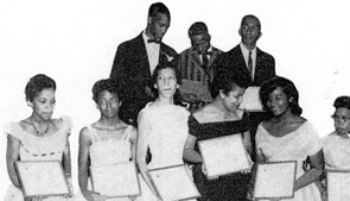
HOTEL AND CLUB VOICE
August, 1958
Her fight in Little Rock adds luster to Liberty's torch
A Governor, a Mayor, a Senator, national and local labor leaders and notables from all walks of life joined Local 6 on June 12 in honoring nine Little Rock high school students for having done the most to advance the cause of civil and equal rights in the past year.
The annual Local 6 Better Race Relations Award was presented to these nine for what Pres. Carl Schutt termed "their dignity and unfailing courage during the tense school year just ended." Inscribed forever among America's heroes and heroines in the fight for full democracy are the names of Local 6's 1958 Award winners: Minnijean Brown, Elizabeth Eckford, Ernest Green, Thelma Mothershed, Melba Patillo, Gloria Ray, Terrance Roberts, Jefferson Thomas, Carlotta Walls.
While foes of unsegregated schools are even now busy at work in an effort to evade the decision of the U.S. Supreme Court and violate Article XIV of the U.S. Constitution, a union-Local 6-in honoring these nine, was focusing national attention on the need to end the undemocratic blight of discrimination in our land.
It is 20 years since Local 6 was founded. In all that time, it has unrelentingly opposed discrimination in all its forms. The Union ended the days when managements played African-American and minority groups against white workers to keep them divided, unorganized and exploited.
That history of 20 years...and what remains to be done... the July issue of THE VOICE was omitted to highlight and review in this enlarged special August issue. For this ambitious project, the editorial board of THE VOICE wishes to acknowledge the invaluable assistance of the editors of HOTEL VOICE, the weekly newspaper of the Hotel Trades Council, and the Council's president Jay Rubin. Inspired by the example of the Little Rock Nine, it is our hope this special issue will deepen the understanding and determination to completely wipe out discrimination in our industry, city, state and nation.
Little Rock and our own backyard
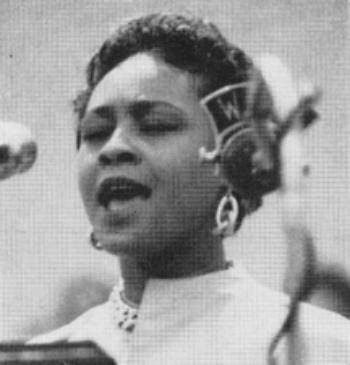
Great feats of heroism are required in many areas of our country to secure simple and elementary democratic rights. Over 6,000 of our members voted to honor such heroism earlier this year when they selected the nine Little Rock students as winners of the annual Local 6 Better Race Relations Award.
Our deepest admiration goes out to those in the South who literally take their lives in their hands when they attempt to join or organize a union; to obtain unsegregated and equal educational opportunities-or dare to attempt to register to vote. Admiration for such courage is merited. But we should also be deeply alarmed at this state of affairs.
So long as southern employers feel free to use white supremacy to divide workers and prevent union organization, just so long will organized workers face the double threat of a competitive non-union, low wage area and their political representatives in Congress to block or compel concessions on all social and labor legislation that is most vital to the interests of working people.
Thelma Carpenter, famous Broadway singing star, opened the Awards meeting with the national anthem and entertained with songs during the evening.
We in labor must take a sharp critical look at ourselves. We must ask ourselves why, as the largest organized force in the country devoted to political democracy and economic advancement, we haven't been able to change this basically undemocratic situation.
It is correctly said that if all had the right to vote in the South, that one fact would change the whole backward and reactionary character of that area-and its political representatives. In New York we have but to take a walk and sign our name to register. If enough of us did in just a few districts, the 27,000 members of Local 6 could well be the decisive influence as to what kind of candidates would be nominated and elected.
Candidates are needed today who will combat the unholy combination of labor-baiters, white supremacists and smug and cynical politicians that run rough-shod over the rights of labor, the African-American people and minority groups-or do little or nothing to halt them.
We in Local 6 are taking special measures this year to make sure our
members register their influence as effectively at the polls as we do in
the shops. While we admire and hail the courage of the Little Rock
Nine, let us make sure that in our own backyard we exercise our precious
right to vote-and put candidates in office who will enact firm
democratic guarantees that will end the need for exceptional courage and
self-sacrifice to exercise elementary democratic rights.
For heroism under fire in the fight for equal rights
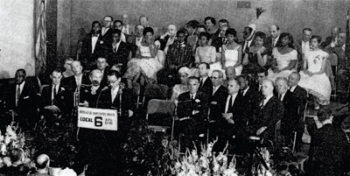
Local 6 annual Better Relations Award to nine Little Rock high school students climaxes 20 Years of Union's struggle for equal rights for all.
Turned full on Local 6 this past June 12, the eyes of the American nation -television cameras, swarming and shouting press photographers, reporters for the great newspapers and press associations - witnessed a tremendous outburst of enthusiasm and dedication on behalf of equal rights for all. On that day Local 6 emerged on the national scene, taking its full and proper place on the stage of history culminating 20 years of struggle for civil rights, equal opportunity, non-segregated housing, schools and jobs.
On the stage of Gertrude Lane Auditorium sat the nine African-American students of Central High School, Little Rock, Arkansas, flown to New York by Local 6 to receive the Union's annual Better Race Relations Award. Around them sat the general officers of the local, the members of the Hotel Trades Council executive hoard, dignitaries of public life, labor leaders, officials of the National Association for the Advancement of Colored People.
"I am here," New York's Governor Averell Harriman told members of the Local 6 Assembly and Shop delegates, who jammed the auditorium, "to join in paying tribute to these nine children whom we have watched during the past nine months with a great deal of concern, admiration and hope."
City's Welcome

New York City opened its heart to the courageous students from Little Rock and Mayor Robert F. Wagner made it official when he cancelled previous out-of-town commitments to personally welcome them at City Hall
Friday morning, June 13, it was made official what was already a fact-that the Little Rock Nine were among the most welcome guests New York City had ever welcomed. Though Mayor Robert F. Wagner had a long-standing previous engagement out of the city at the time the Little Rock Nine were due to arrive, he showed all New York's understanding and appreciation of their bitter year by canceling the engagement and personally welcoming them at City Hall.
Paying high tribute to Local 6 for presenting its annual race relations award to the nine, the Mayor told the young students he was "very proud" to welcome them. The Mayor pointed out that though New York City stands in the forefront of the battle for civil rights, there remains much to be done in combating discrimination.
"Everybody here will take you to their hearts," the Mayor said, "and you will be one in spirit with us in our continuing fight to do away with the last vestiges of discrimination."
Mrs. Daisy Bates, Little Rock NAACP president, in turn, told the Mayor that after eight months of "very unkind treatment, I think the children needed just the kind of reception they received in the city."
As for Minnijean Brown, who had been expelled from Little Rock's Central High for "answering back" to harsh treatment by white students, Mrs. Bates said the welcome and time spent in a New York school had restored Minnijean's faith in democracy. General Organizer Betty Bentz responded on behalf of the Union to Mayor Wagner's greetings.
Remarks from the Local 6 Better Relations Award
Carl Schutt - Local 6 President
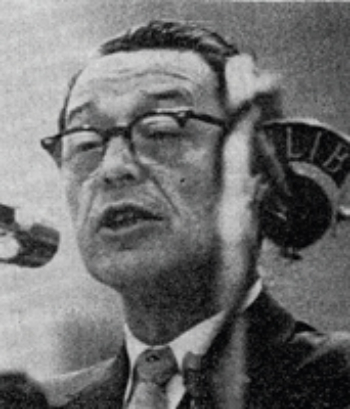
The following are highlights of the speech of Local 6 President Carl Schutt at the meeting on June 12 at which the Local 6 Better Relations Award was presented to the nine Little Rock students.
We meet here tonight just a little over four years since the day, May 17, 1954, that the highest court of our land made its historic decision that in the country of Jefferson, Lincoln and Franklin D. Roosevelt it is unconstitutional to discriminate against any child in our public schools.
The Supreme Court ordered enforcement of its decision with "deliberate speed." There may be varying interpretations of what deliberate means, but we, the members of the largest culinary local union in the world, understand perhaps more than most, what speed means when it is a question of ending, once and for all, any barriers to the complete democracy that has always been the promise of America.
Only by deliberately speeding an end to discrimination was it possible to build the mighty and united institution we have today, which has achieved dignity and a new life for the hotel and club workers of New York City. Had we not made that our foundation stone - none would have achieved the standards we all have today. And when we established our Civil Rights Award a few years ago, it was for the deliberate purpose of promoting on a national scale the fight for full civil rights that we had conducted so successfully in our own industry.
It is because too many people in high places are deliberating rather than working to speed the full implementation of the Supreme Court's decision that some of the finest persons in our country-such as our guests tonight from Little Rock-are compelled to demonstrate almost superhuman courage to secure their constitutional right of an opportunity to an equal education, without discrimination.
Averell Harriman - Governor of New York
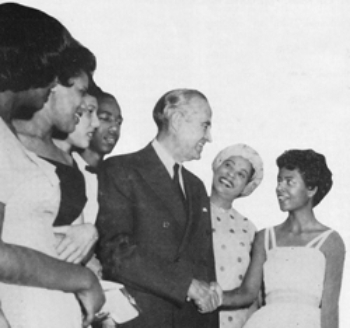
The leadership that has been given in Arkansas by Mrs. Bates and her colleagues of the NAACP, and the children who undertook to carry forth their share of carrying out the great decision of the Supreme Court, deserves our respect and our gratitude. I've come here tonight to join with you in making that expression to them. But as we think of this issue, we all have a job that is to be done.
Local 6 has done a fine thing tonight in singling out these nine youngsters for your award. The Supreme Court decision is going to be carried out not just because it is the law of the land. Of course, the laws must be obeyed, but it is going to be carried out and it must be carried out because it is morally right.
I think that we should call a spade a spade and one of the unhappy situations in which we find ourselves in this country is that the President of the United States speaks of the Supreme Court decisions as being decisions that should be carried out because they are the law. Now that is not enough, let me repeat. The President of the United States should say that they should be carried out because there is a moral principle involved and that principle is the principle on which our nation is founded. He should speak out and rally all men and women of good will throughout the nation. As Governor of your state, I feel I have the obligation to speak out.
One day, history will point to the courage shown by the African-American children of Little Rock in the face of both official and mob action in keeping them out of school. They are the real heroes. And they will occupy a niche in the annals of the nation.
I say there is an obligation on every Governor in our nation, the Governor of Arkansas, the Governor of every single state, to uphold the law and to support those good people of each state who want to do what is right, and who want to carry forward the principles of our nation and certainly support of the Constitution.
I have said and I repeat again tonight, that when the Governor of Arkansas, Faubus by name, calls out the National Guard, not to uphold the law but to defy it, he is not behaving as an American. I believe that that man Faubus will go down in history as the word "lynch" or the word "quisling," or other names of men who have gone down as a man who failed to do his deed, as a man who used public office against the public interest rather than to carry out the oath of his office.
If we are going to say such things as that, we ourselves here in New York must help make progress in the elimination of the discrimination that still exists right here in this city and state of ours. In spite of opposition, I'm glad to say that the last three years we have made some progress and I think we can be gratified at it. We've made progress in the question of employment, in the right to advancement in accordance to a man or woman's skill and abilities and willingness to work.
One of the nice things that has happened is that we've induced two of the airlines to employ African-American hostesses. One of them was an employee of the New York airline and the other was from International Airlines, and when that charming young lady goes around the world, it will help to counteract the pictures that appeared on the front pages, of these youngsters that were kept out of school by soldiers.
Then there is a question of housing. I think that we should give great credit to those who battled through the City Council here in New York a law to end discrimination in private multiple housing, the first city in the union to have such a law on its books.
For two years now, we had legislation of that kind in the legislature and both years I have supported it. Now, let's get together and get it through on a state-wide basis so that we can be the first state to have such a law on our books. But it's not enough to have laws on our books. They've got to be carried out. We have the right to demand of people all over the United States that they put aside their inherited prejudices for the welfare of our country and the security of our nation.
I want these nine children to leave New York with one feeling and that is that in New York there is love and affection for them. That is a doctrine that we must preach - love and affection for our neighbors, love and affection for all of the young people that are growing up and love and affection for all citizens who are ready to abide by the principles on which our nation is founded. If we adhere to that, we will march forward together to higher principles for our whole country and ourselves.
I want to express to you of Local 6 my congratulations, to every one of you for this fine thing that you have done. It is an example to all of us in the state, an example to the nation. Carry forward your good work.
You are an inspiration to your Governor, just as you are to everyone else that has had an opportunity to see the fine work that you have consistently been doing to eliminate prejudices and to give everyone a fair opportunity so that the great boon and happiness that all Americans are entitled to will be spread to every family in our state and in the nation.
Jay Rubin - HTC President
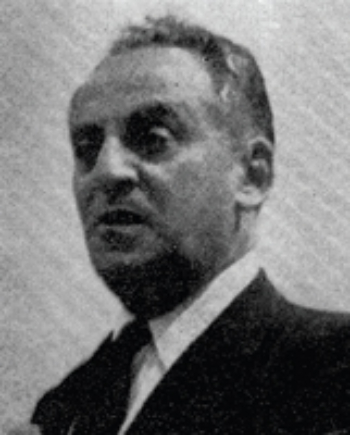
The following are highlights of the remarks made at the Local 6 Better Race Relations award meeting by Jay Rubin, president of the Hotel Trades Council.
I feel honored that our membership has voted to grant the award this year to the heroes of Little Rock. I'm especially glad that it was a trade union. I am more than glad that it was our Union that did it. The reason that I'm so proud is because I want not only you, but also the heroes of Little Rock, to know that it was the labor movement, the trade union movement of this country, that was always in the leadership of the fight for the rights of the people. It might have been the fight to abolish sweatshops, or to establish public schools, or to integrate the workers on the job. On these and many other issues the labor movement has always been ready to fight for the welfare of the people.
In our own Union we have carried on such a fight since our inception. I want these children from Little Rock to know that the Hotel Union is a Union of all people. There is not a nationality in the world that you will not find among the workers in the hotel industry.
I also want you youngsters to know that 20 years ago, before our Union was established, the hotel industry was a lily-white industry and African-Americans were not allowed to work in it. Nor were other minority groups. It took a fight of 20 years for us to be able to say today that in the majority of departments there are mixed groups at work, African-American and white. This integration on the job has worked out so successfully that nobody, viewing the results, can question the rightness of integration in schools or any other place.
But there are still lily-white hotels. There are still lily-white departments in some of the hotels. Our fight is not over yet in trying to see that the African-American workers in our industry are promoted to better jobs, to advanced jobs, so their earning power is increased. Our fight against discrimination is not only a fight for the African-American.
Another problem in our industry today is represented by the thousands of Puerto Ricans who are discriminated against and who in many instances are given the most menial jobs. We must fight also to eliminate this discrimination and establish the right for these Puerto Rican workers to be promoted exactly as anyone else.
I want to say to our young guests from Little Rock that their fight has been an inspiration to all of us. There are many people who have forgotten the fights in which others made great sacrifices so that we may enjoy our present benefits and our present standard of living. And some are so forgetful that they are submitting to backward attitudes. They say: "Why should we fight for integrated schools; let them have separate schools. Let's have separate locker rooms for the African-Americans. Let's have separate locker rooms for the Puerto Ricans."
Yes, there are some like that. And there are some - and even a few are too many - who say: "Why should we stick our necks out and speak up on this issue and other issues? Let's submit. Let's not stir up trouble. Let's go along with things the way they are." An attitude like that can only set our country back, and can only halt our progress.
The fight of these children - who didn't take the easy way - has inspired us and strengthened our feeling that we cannot just sit idly by. We cannot say, "Let George do it," that it doesn't affect us. It very much affects us. These children have inspired us to continue the fight and, let me emphasize, to continue it right here as well as supporting them in the South.
Let me also tell you children that even though you will see New York, you will see its brightest aspects. There is no question that in comparison with the atmosphere in Little Rock, New York is a haven. But there is discrimination in New York.
There is housing that minorities are not admitted to, and there are other places where discrimination is encountered. There are the private clubs, which the anti-discrimination law of the state of New York does not yet cover. These clubs have a legal right to discriminate against the African-Americans coming in to work! This is a campaign that we hare to carry on.
Our fight here will help you to carry through the fight in the South. Your inspiration will help us not to lay low, but to continue this fight. So we can't just always be satisfied and put ourselves on the back and say that everything is good.
We have a good governor but he has a Republican legislature. They stand in his way in efforts to advance the fight for equal rights. We say to the Governor: "You are on the right road. The people of New York are behind you. The establishment of equality is the basis for the foundation of democracy, for the organization of the workers."
Now let me say to you that the reason the enemies of equality are getting away with their policies is because the labor movement in the South is not organized. The reason they are successful is they have kept the workers divided, exactly as they kept us in the New York hotel industry divided, to prevent us from organization. The fight for equality and the fight for the right to organize and to bargain collectively with the employers most go hand in hand.
We tell these children, we pledge to them, that we will be behind them. Their inspiration will be a guide to us all. And you delegates in the hotels must be the ones to see to it that no hotel in this city shall remain lily-white.
Betty Bentz - HTC General Organizer
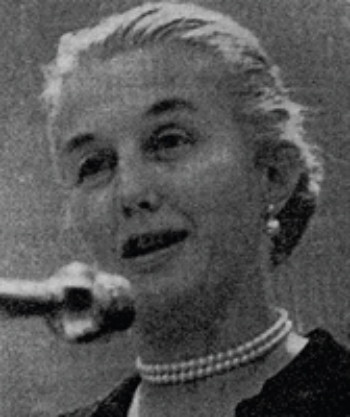
The following remarks were made by Local 6 General Organizer Betty Bentz, who is chairman of the Local 6 Civil Rights Committee, in presenting the 1958 Better Relations Award to the Little Rock Nine.
On May 17, 1954, the Supreme Court of the United States handed down a decision which answered a historic question: "Does segregation of children in public schools, solely on the basis of race, deprive the children of the minority group of equal educational opportunities? We hold that it does."
This fateful decision held, in brief, that segregated public education is unconstitutional. This decision was a great milestone in American history, in our march toward equal opportunity for all our citizens.
But a new law or a new decree does not automatically bring results. Equal schooling for African-American students was not achieved overnight, or by the next school term, either. In fact, three years after the Supreme Court decision, the Federal Government had to move troops into Little Rock to safeguard democracy.
Under the eyes of a watching world, nine African-American high school students were thus enabled to exercise the rights guaranteed them in the Constitution.
These nine Little Rock students braved the threat of mob violence. Although there were troops outside the school, in the locker rooms, the gyms, the school rooms, the corridors and the stairways these nine students were on their own, a tiny few in a hostile world.
This is the history of progress. The great deeds are done by men going to work or children going to school. Somebody must do the difficult tasks first.
These children had to face a wall of prejudice and hostility and still, despite this, managed to apply themselves to their schoolbooks, to obey all the rules and to be more perfect than the next student. It takes a special kind of courage to face all this and to live with it day after day. We honor that courage tonight.
Central High School in Little Rock, Arkansas, became, last year, a laboratory for social change. This is what happened at Little Rock. These students, guarded by the guns of soldiers, made friends as they went along. And if this happened in bitter, strife-torn Little Rock, it can happen anywhere. This year past was tense and difficult for these nine students, but all of us, everywhere, benefit by the results. We honor them for that.
There is a legend that young people of our country are a "silent generation," content with the lot that is handed them, anxious only to conform, afraid to speak up or to strike out on new paths. The courage of these nine Little Rock students should end all of this without delay. This so-called "silent generation" is clearly as ready as was our own, or perhaps more ready, to take up the task of making America in full what our Constitution charted so long ago.
Here, in these nine young people, we have proof that the great dangers and great needs of our time will be met with fortitude, with willingness and with intelligence by the young people who are coming to maturity. We honor these nine students for giving us this priceless pledge.
Our Better Race Relations Award symbolizes our attitude in this field. It speaks for the fact that the trade union movement is in the forefront of the fight for equal rights for all, regardless of race, background, color or creed.
You will find officers of Local 6 on this platform who represent this gamut of freedom and equality. You will find this equality represented in the makeup of our Union's leadership in the shops. You will find it in our history - our participation in the past year, for example, in the Freedom Crusade to Washington, in the successful fight for the bill to end discrimination in housing in New York City, our support of the bill to end housing discrimination in New York State, our enlightened policies in every aspect of this field. We do not claim perfection, but we stake our honor on better race relations at home and abroad.
Charles Zimmerman - AFL-CIO Rights Committee Chairman
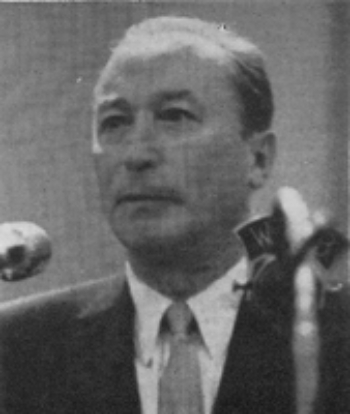
The following are excerpts from the remarks at the Local 6 Better Race Relations award meeting made by Charles Zimmerman, chairman of the national AFL-CIO Civil Rights Committee.
I'm very happy to be here tonight and to congratulate Local 6 for the splendid idea of establishing this Award, and especially this year for giving it to the children who symbolize the struggle throughout the length and breadth of this country for integration in the public schools. The people here and in many communities throughout the country, African-Americans and whites, Jews and Gentiles, are all with them in this struggle.
Governor Faubus does not represent our country. I think that Governor Harriman in his struggle for civil rights represents this country more and represents truly the democratic traditions of our country.
As the chairman of the Civil Rights Committee of the AFL-CIO, I want to state that Local 6 is carrying through now the constitutional provisions of the merged labor movement for the struggle for civil rights against any sort of discrimination wherever it may appear outside or inside the labor movement. We'll fight against discrimination no matter in what form it expresses itself-whether it's in the public schools, whether it's on the job, whether it's in housing, whether it's in education or any other way.
The 16 million organized workers in this country are for integration. They're against any sort of discrimination. They want equal opportunity for all people, for all workers, regardless of race, color or creed. Friends, there is a mighty organized force in this community. We'll fight and demolish all the rocks that stand in our way, and, whether little rocks or big rocks, we'll demolish them all.
Hulan Jack - Manhattan Borough President
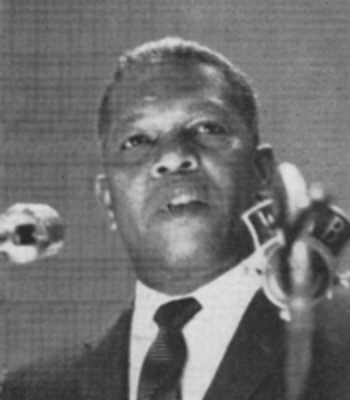
The following are excerpts from the remarks made at the Local 6 Better Race Relations award meeting by Hulan Jack, president of the Borough of Manhattan.
I wish to thank the Civil Rights Committee of the Hotel & Club Employees Union, AFL-CIO, for the invitation to participate in this memorable program of paying tribute to these nine students who exhibited great heroism, courage and determination to get an education under the Supreme Court decision of 1954.
What happened in Little Rock reverberated over the entire world. We can never compromise where justice is concerned, nor can we condone any attempt to deny our children an equal opportunity to an education. Any violation, therefore, of their rights must be met firmly and resolutely. This recognition of the valor of these students by your Union, so richly involved in the awards made to them, is worthy of high praise and commendation.
Let us resolve tonight that in the tradition of our democratic ideals, we will never relax our vigorous efforts in the continuing fight for full and equal rights under the law for all of our citizens, wherever they may be, regardless of race, color, creed or national origin.
May the hearts and minds of all of our citizens here in New York be permeated with the spirit of fair play and sportsmanship to the end that following the pattern of our open city policy, we will always lead the way in ending discrimination and segregation and that we will ever be in the forefront of carving out a better life for all.
And to these nine children, our adorable children, we hail them, we adore the nine of you representing the spirit and the conscience of the new America.
Harry Van Arsdale, Jr. - NYC Central Labor Council President
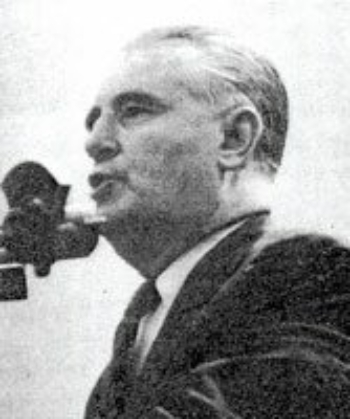
The following are excerpts from the remarks at the Local 6 Better Race Relations award meeting by Harry Van Arsdale, Jr., president of the New York City Central Trades and Labor Council.
Tonight is a great night for the labor movement and a great night for our country. Discrimination of all types is something that everyone has a responsibility to bring an end to. It is not, as these youngsters and those supporting them have learned, an easy road and it will not be an easy road.
When I had the pleasure to meet these nine youngsters, the thought came to my mind, "How could anyone, man, woman, northerner, southerner, anyone who claims to be a member of the human race, be mean to these nine lovely American children?"
And when you come to realize the people that might in many other ways be normal, who brought about the disgrace to our country in Arkansas, it just brings to our minds what bigotry and hatred and fear can do to what are otherwise decent people.
I think that Local 6 has made a tremendous contribution. What I have seen here tonight I will do the best that I can to convey to the unions of the Central Trades and Labor Council, because we must all be honest with ourselves. All the discrimination is not in the South.
Earlier this evening, I reported to 3,500 members of the union I have the honor to represent what you were going to do this evening, and the fact that Jimmy O'Hara (Secretary, Hotel Trades Council) and myself had been invited here. There was an instantaneous response from the entire membership, which showed the tremendous approval there is for people like you in Local 6 and your officers and members, having the courage to do the right thing. I want to congratulate them.
I wish these youngsters every success for the future. I know that their trip here will indelibly impress on them the responsibilities that they have to continue the fight that they have carried on so well.
Roy Wilkens - NAACP Executive Secretary
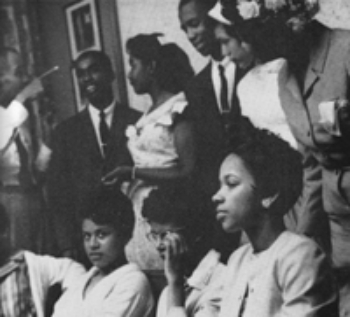
Now this is a continuing struggle. This is a struggle for, as has been said, Jews and Gentiles, northerners and southerners, African-Americans and whites, Spanish-speaking persons, both on the east coast and in the southwest, and has been a struggle for some of our other peoples in America from the old country, who were not accepted at first when they came to these shores.
They had to fight prejudice, they had to fight restrictions, and they had to fight discrimination. Many of them had to fight to get into labor unions, even as the African-Americans have had to fight to get into labor unions. There was discrimination against so many of them and there is no need to call the roll.
But always in a free society you can make known how you stand, what you believe in, and this Local 6 has done tonight in its award to these young people from Little Rock.
I don't think we ought to become discouraged over this continuing struggle for decency because man has been working at it for many centuries. We only become discouraged when those who should speak out and can speak out, do not speak. When we adopt that kind of attitude, then democracy is on its way out. Because, never fear, the men and women who do not want democracy do not sleep. They are ever alert and have no scruples and no ethics.
We have not only the expressing of our views and the choosing of sides, but we have the actual testing in the fire of the furnaces. No movement is ever won, no philosophy is ever triumphant, and no government ever comes to full rule, without those who actually sacrifice in the heat of battle.
You know that a union fight is not won without some work on the picket line. You know this country as a democracy was never fashioned and never safe until men were ready to die when, as the expression goes "the chips were down." The philosophizing was all over and now it was time to act, and unless you have actors at that time, in the crucial spot at the right time, with the right philosophy and the right weapons, you lose.
So, in Little Rock, when the chips were down, when it wasn't a question of arguing before a judge, or passing a resolution, but the question was "Who goes up and in the door of that high school - no matter how many mobs are outside?" These kids were the kids that did it. I don't have to tell your Union, that in the final analysis, that's what counts.
Daisy Bates - Little Rock NAACP President
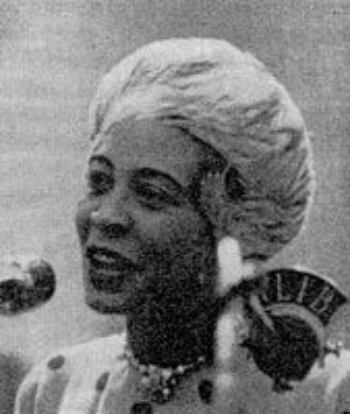
The following are highlights of the remarks of Mrs. Daisy Bates, president of the Little Rock NAACP, at the Better Race Relations award presentation.
When you honor the children you are honoring me and when you honor me you are honoring the children. We accepted tonight with humility and great sadness, representing a chapter in American history that should never have been written.
Your action here tonight will give us courage to return to Little Rock in September 1958 to continue the job.
With the graduation of Ernest Green we won a victory for one. But we must return to the South and win a victory for many. It hasn't been easy, friends. In the last week one boy was kicked every day of the school day for one solid week, but he returned each day and he told me: "Mrs. Bates, I was kicked again today, but I'll be back in the morning."
That's the kind of courage it takes. The children threatened not to go back to school to take their final exams because of the harassment. Vice-President Nixon experienced it for just one day, but these children have gone through this for eight long months.
So we say to you tonight: Support our organization, support your organization that they may support us. We need your help in the South and unless we fight down there, unless you help up here, we cannot continue the fight there.
Jacob K. Javits - US Senator
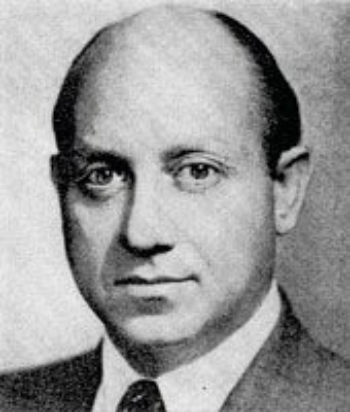
The following telegraphed message was sent to the June 12th Local 6 Better Race Relations awards meeting by Jacob K. Javits, United States Senator from New York.
To the nine Little Rock young people: Your example has inspired the world. Its dignity, its modesty and its truth have made their impact upon all people who love liberty and justice and those who know how to practice it best.
Though so young, you are singularly blessed to have already made an historic contribution to the dignity of man and the mutual respect of one person for another without regard to race, creed or color. By your conduct you have made a major contribution to implementing the Supreme Court's historic decision ruling out segregation in our public school systems.
You know, we know, and even those people who today are convinced that the Supreme Court is wrong know, that the march of progress is in the direction of the elimination of segregation and the establishment of the proposition that all men are not only created equal, but are equal.
It is with deep regret that I find that the continuing session of the Senate tonight keeps me from being with you to welcome you and congratulate you in person.
I hope very much that you will remember, however, my deep feeling for what you have done and for what it means to free institutions, to our nation and to our time.
At the United Nations
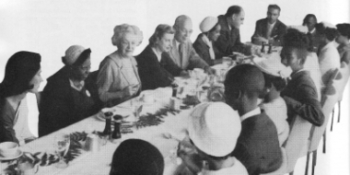
In the midst of tense world events, UN Secretary Dag Hammarskjold and Under Secretary General Ralph Bunche took time out to officially greet and welcome the Little Rock Nine to the United Nations.
When Ralph Bunche, United Nations Under Secretary and Nobel Peace Prize Winner, heard the Little Rock Nine were coming to New York, he insisted on the opportunity to personally meet and welcome them. When the International Confederation of Free Trade Unions heard the Little Rock Nine were coming as the guests of Hotel and Club Employees Union Local 6, William Kemsley, its UN representative, personally made arrangements for the most enjoyable and educational tour of the UN.
When the Little Rock Nine arrived on Friday afternoon, June 13, Ralph Bunche was not in his office as expected. He was in a special conference with UN Secretary General Dag Hammarskjold on the tense events in Lebanon that had erupted that week, Kemsley sadly informed the young guests. Kemsley proceeded to introduce them to their specially assigned guide, Mrs. Lea Rangel-Ribeiro, of India and they proceeded to lunch as guests of UN officials.
Bunche "apologized" for interrupting their lunch, and then told them: "In a real sense, what you've been doing is what the United Nations effort is in the international community - to meet provocation with reason and restraint, but to be firm in our determination to stand for right and justice. The whole world owes yon a debt of gratitude for what you've done."
Bunche drew warm chuckles when he made a comparison with himself at their age. He said he doubted he could have had such restraint, since he was not always "a man of peace," and had, in fact, been a "chip on the shoulder" type of person in his high school days. Bunche and Hammarskjold then hurried to a meeting for which they were already late, after a final good wish from Bunche that they have a pleasant next year, though not a more exciting one.
Continued battle for school integration
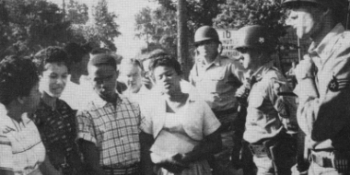
Foes of school integration continue to make Little Rock key testing ground for opposition to the United States Constitution
LITTLE ROCK: Then and now
The United States Eighth Circuit Court in St. Louis has announced the appointment of three judges to hear the appeal on the court order barring racial integration in Central High School for two and one half years. This is one more legal twist in the bitter struggle taking place in Little Rock.
The beginning of the story is the historic 1954 decision of the Supreme Court ordering the schools to integrate. The Little Rock Arkansas school board took three years to comply with this decision.
In August of 1957 they announced that integration would go into effect with the opening of school in September. Nine young African-American youngsters registered. They were met on the school grounds on September 2, opening day, by uniformed troops, who barred their way. Gov. Orville Faubus in outright defiance of law had called out the National Guard. The children did not gain entrance to the school.
On September 3, Judge Ronald N. Davies ordered the school board to proceed with integration. Governor Faubus, however, kept the troops at Central High. Not until September 20, when Judge Davies ordered that there was to be no interference with his original order, were the troops withdrawn. By this time, however, the White Citizen's Council and the mobs had time to organize. For on September 23, when the children attempted to enter the school, violence and rioting broke out.
It was at this point that President Eisenhower sent in the 101st Airborne troops and took the National Guard out of Faubus' control by federalizing it. The children attended the school first with hundreds of troops surrounding the grounds. Soldiers drove them back and forth to their homes. Later, there were just a few who patrolled the halls, the gym classes and the cafeteria. Finally, most of the troops were withdrawn, leaving only a few to assure order.
The incidents within the school, however, continued. Fed by the bias and prejudice of their families, fellow students made a game of constant harassment.
In February, the school board went to the Courts asking that integration be stopped for two and one half years, pleading "unfavorable community attitude."
The case was heard by Judge Harry J. Lemley, a 74-year-old native Southerner. Judge Lemley ruled on June 21 that integration could be halted until 1961.
NAACP lawyers, who had been fighting the students' case through the Courts, requested that Judge Lemley suspend his order. This he refused to do. The case was then taken to the Court of Appeals and as THE VOICE was going to press a request had been made that the hearing be held on August 4. This would give the courts an opportunity to hand down a decision before school opens in the fall.
The Little Rock Nine
Minnijean Brown
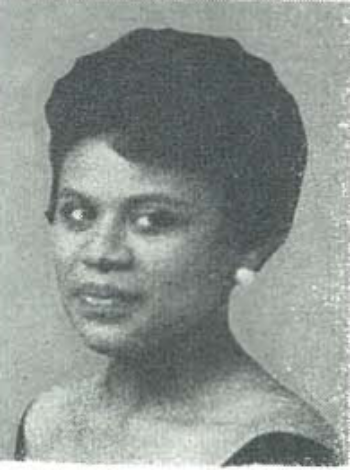
She is the only one of the nine students who began the term at Central High School who was not permitted to finish the school year. Minnijean, 16, mature beyond her years, endured the daily insults until they became unbearable and finally spoke back to a white student. Suspended, Minnijean accepted a scholarship at the New Lincoln School in New York City. Here, she could engage in the after school activities with her classmates (she had tried out for the Christmas chorus program at Central, been accepted, and at the last moment was told that perhaps it would be better if she didn't participate). Minnijean would like to return to school in Little Rock, despite her acceptance here in New York. She feels a kinship and obligation to the other students she started the year with.
Elizabeth Eckford
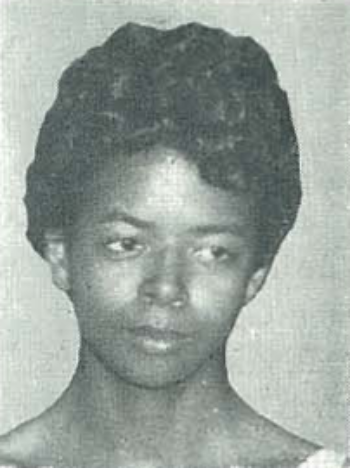
Shy and quiet, Elizabeth appeared in the most publicized picture of the fight in Little Rock. It was the unforgettable sight of a small young girl surrounded by hostile soldiers and looks of hatred of the mob that had gathered. She had gone to the school alone that first day, not knowing that the other students were going as a group. Her family, unlike the others, had no telephone. Elizabeth's decision to attend Central was her own, and was one that her mother hoped she wouldn't go through with. She sews well and designs her own clothes. She loves rock n' roll music, and wishes she could brush up on her French. Still only 16, she is in her manner and her interests like any other teenager.
Ernest Green
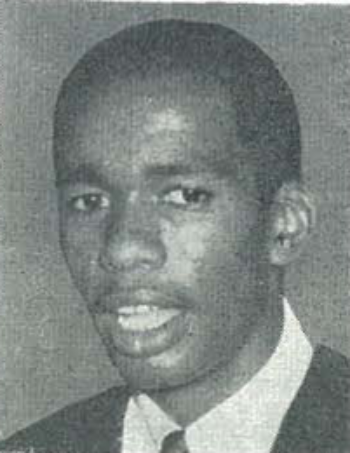
Only 16, he was the first African-American graduate of Central High School. He dismisses the fact that he graduated so young by indicating that his mother was a school teacher and so he learned his school work a bit younger than most. He handles himself with sureness and is even able to talk of the events in Little Rock with good nature. His grades, despite the pressures, were excellent, and his interests varied. Never far from his camera while in New York, he took almost as many pictures of other people as the photographers took of him. Ernest was the natural leader of the group of students, done with a poise his sister says that he has had since a small child. He enters Michigan State University this fall on a scholarship.
Thelma Mothershed
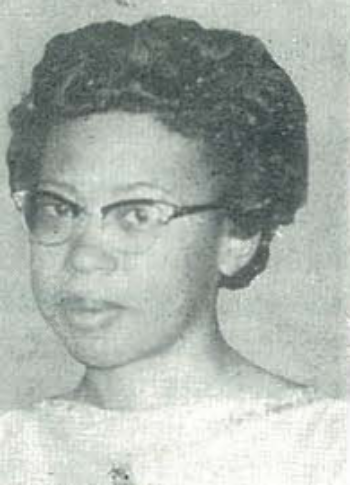
The quietest of the group, Thelma is also the smallest. A mere slip of a youngster, 16 years old, she had had long experience in learning patience.
While in elementary school she suffered an attack of rheumatic fever that kept her out for three years. At that, she is only a year behind in her studies. Thelma has always wanted to be a schoolteacher; ever since the first day she ever attended one. Nothing that happened at Central High School this past term has shaken that ambition. Her pastimes are quiet ones, necessitated by her health (she would love to be able to dance), and include baking cookies, crocheting, reading or going to the movies.
Melba Patillo
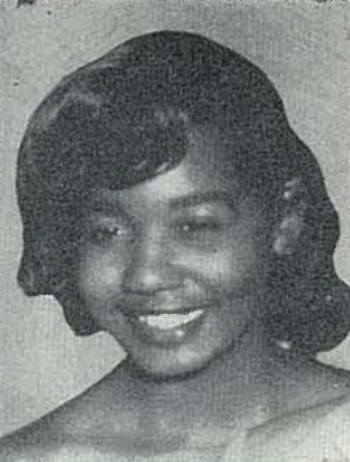
She is a determined girl who bubbles with enthusiasm. She shrugs off the behavior of some of her fellow students in Central High School with something that is akin to pity. Always ready for anything that promises to be fun, she has a flair for the dramatic. She sings, dances and plays the piano. Two songs she composed herself have been copyrighted. Most of all she would like to be a professional entertainer. The insults, the anonymous telephone calls, she and her family have endured with patience. She knows that it is just a small group within the school that has worked hard to make it difficult.
Gloria Ray
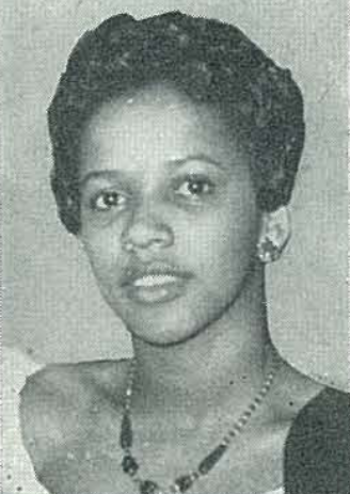
Sixteen years old, with a twinkle in her eye that is not to be underestimated, she registered for Central High School over the opposition of her parents. Her explanation for doing it was that she had driven down to register at Horace Mann (the African-American high school), and had somehow gotten mixed up in traffic.
It was not an easy year, and yet Gloria felt sorry for a white girl who, having befriended her, began receiving the same treatment as the young African-American students. Her best subject is math and she would like to continue her studies in one of the scientific fields.
Terrance Roberts
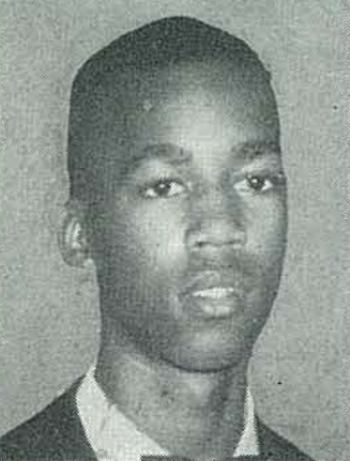
An excellent student, ranked scholastically highest of the group of nine who entered Central High School, he seems to have suffered the worst abuse from some of his fellow students. Inside the school, before the arrival of federal troops, he had been followed in the halls, pushed, kicked and had his books knocked from his arms. Once he almost decided to quit, but felt that he couldn't desert the other eight students he had started out with. Yet Terrance continues with his life as it was. He reads as much as ever, and plays football, baseball and basketball after school. He is the kind of boy who though extremely sensitive managed the school year with poise and finished with grades far above average.
Jefferson Thomas
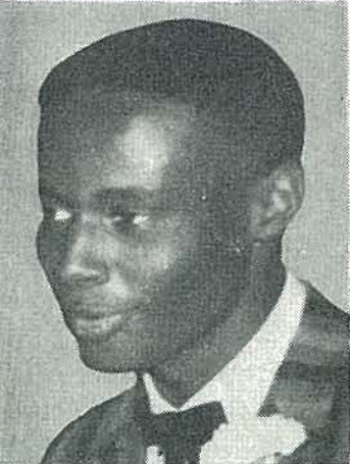
"Never fight when you can run your way out of it". This was Jeff's attitude about making it with all possible speed to the principal's office when 20 white boys in Central appeared to be ganging up on him. He's just the boy to do it. Track is his best sport. Jeff has won medals for the 880 and 440 relay teams.
At first meeting, he impresses a person as a quiet boy and very serious. But he has a grin that lights up his face and is full of merriment. The previous year he had won an award in his school as the most outstanding boy of the year. He was also president of the student council. College still seems a long way ahead, but he's determined to get there.
Carlotta Walls
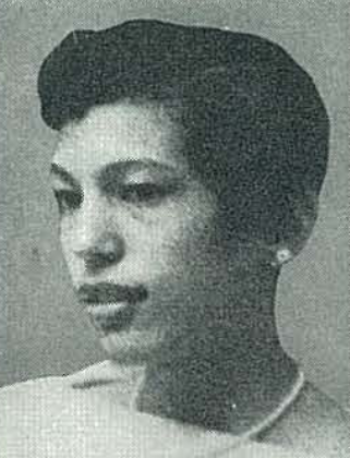
Fifteen-year-old Carlotta was the baby of the group attending Central high School. A tall, thin youngster, inclined to be a bit of a tomboy, she still seems not to have grown accustomed to the length of her arms or legs. Sitting still in one place for more than a few minutes at a time is difficult for her. It's a boundless energy and a sense of warmth that has her wanting to be everyplace at once so that she won't miss anything. Carlotta had always wanted to go to Central as soon as she knew what integration meant. She wants a good education and a chance to be treated just like anybody else.


